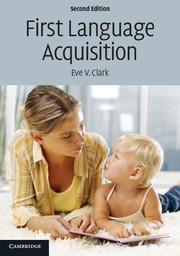Book contents
- Frontmatter
- Contents
- List of tables, boxes, and figures
- Acknowledgements
- 1 Acquiring language: Issues and questions
- Part I Getting started
- Part II Constructions and meanings
- Part III Using language
- 12 Honing conversational skills
- 13 Doing things with language
- 14 Two languages at a time
- Part IV Process in acquisition
- Glossary
- References
- Name index
- Subject index
13 - Doing things with language
from Part III - Using language
- Frontmatter
- Contents
- List of tables, boxes, and figures
- Acknowledgements
- 1 Acquiring language: Issues and questions
- Part I Getting started
- Part II Constructions and meanings
- Part III Using language
- 12 Honing conversational skills
- 13 Doing things with language
- 14 Two languages at a time
- Part IV Process in acquisition
- Glossary
- References
- Name index
- Subject index
Summary
As children become more skilled at using language, they use it in more ways for greater effect. They make use of a growing array of linguistic options to mark social roles for both speaker and addressee. They learn what features identify speech as appropriate for a child compared to an adult, a girl compared to a boy, a teacher compared to a student, a doctor compared to a patient. They learn how to mark membership in different communities in society, from family to classroom, band, computer lab, tennis team, and adventure camp. As children grow up, they become members of other communities and learn how to mark their membership linguistically in each. They also learn how to do things with language: They learn how to be polite and how to be persuasive. They learn how to negotiate to resolve conflicts. They learn to distinguish actual events from play. They learn how to talk inside the classroom as well as outside. And they learn how to tell stories, becoming increasingly adept at presenting protagonists and their motives, and at tracking those events that move the action along.
To manage this, children must extend their repertoires of speech acts. Speech acts have often been represented as a matter for the speaker alone (e.g., Searle 1975), but in conversation, speaker and addressee often collaborate in the production of a single act, so traditional descriptions mislead in leaving out addressees (see H. Clark 1996).
- Type
- Chapter
- Information
- First Language Acquisition , pp. 306 - 335Publisher: Cambridge University PressPrint publication year: 2009



